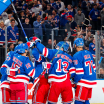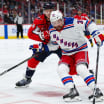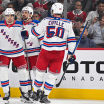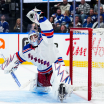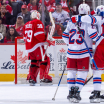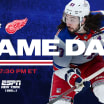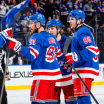SPECIAL TICKET PACKAGE: Join us on 12/2 for an exclusive pre-game meet & greet featuring the GAG Line and then witness Rangers history when Vic Hadfield's #11 is raised to the rafters at The Garden. CLICK HERE TO GET TICKETS »
Vic Hadfield describes himself this way: "I am a Ranger through and through."
He was the captain of the Rangers in the 1970s, the first 50-goal scorer in the history of the franchise, the ultimate teammate - and on Dec. 2, his No. 11 will take its place among the Rangers legends in the Garden rafters.
NYRangers.com will present 11 of the great moments of Hadfield's career, 11 snapshots of the Blueshirts' legendary left winger, 11 for No. 11 - counting down to the celebration of Vic Hadfield Night presented by Budweiser before the Blueshirts take on the Winnipeg Jets on Dec. 2 at Madison Square Garden.
The Rangers were loaded up for a Stanley Cup run in 1971-72. Coming off a stinging seven-game loss to Chicago in the 1971 semifinal, the Rangers had one of the top scorers in the NHL in Jean Ratelle, a 50-goal scorer in Vic Hadfield, and during the regular season had matched a franchise record for standings points in a season.
Their reward for all this once the playoffs came around was a first-round matchup with mighty Montreal.
"We were so determined that this was going to be our year," Hadfield told NYRangers.com. "And everybody knew it: For it to be our year we had to go through Montreal."
Hadfield, in his first season as captain of the Rangers, had just concluded the 1971-72 regular season by scoring twice against the Canadiens in the final game to become the first Ranger in history to score 50 in a season. The Blueshirts finished with a 48-17-13 record and the same 109 points they had in 1970-71, good for second in the NHL.
Montreal was right behind them with 108, setting up a first-round playoff series between the Rangers and the Canadiens, who had won five of the last seven Stanley Cups (and would go on to win five of the next seven, too).
Vic Hadfield Legendary Moments No. 6: Run to '72 Final
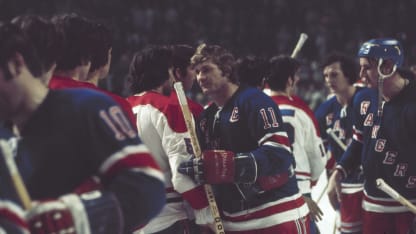
"With the history that Montreal had, it wasn't going to be easy," Hadfield said. "But we stuck together as a group and played our game. With the great goaltending that we had, Brad Park was our Bobby Orr - that's all we needed. Everybody just stepped up and knew how important it was."
The series began on April 5, 1972, at Madison Square Garden, and with the teams holding serve on home ice through the first three games of the best-of-seven, the Rangers carried a 4-3 lead into the third period of Game 4 at the Montreal Forum, when early on they lost their second-leading scorer, Walt Tkaczuk, for the remainder of the game to a third-man-in penalty. Terry Harper quickly tied the score for the Canadiens, and the stalemate lasted deep into the third until, with just more than five minutes left to play, Pete Stemkowski stole a puck from J.C. Tremblay and beat Ken Dryden for the goal that held up in a 5-4 victory and a commanding 3-1 Ranger lead in the series.
The drama of Game 4 was not witnessed back in New York, because TV operators at the Forum had all pulled their plugs in solidarity when the Canadian Broadcasting Company's technicians commenced a strike at the end of the first period. But after the Canadiens squeezed out a 2-1 win at the Garden in Game 5, New York was watching when the Rangers returned to Quebec with the task of closing out the champs at the Montreal Forum or facing the crucible of a seventh game back on Broadway.
"Going to Montreal to play, it was like a war zone," Hadfield said. "Montreal certainly didn't like New York, the fans were on us, we had to have security to get through the building out to the bus, there were people trying to get on the bus to get at us, there were skirmishes - it was like a movie.
"Montreal was a very, very powerful team. But we knew we could beat them, and they knew we could beat them. They couldn't stand us for that. But (where the game was) didn't matter to us - naturally at home we had such good support, but going into Montreal to go play, we knew we could win."
Back at the Forum, the Rangers got a pair of goals from Billy Fairbairn in the opening 40 minutes, and while Game 6 carried another deadlock, 2-2, into the third period, this one didn't last long. Only 29 seconds, in fact, before Dryden whiffed on Tkaczuk's drive from 50 feet out, giving the Rangers a 3-2 lead. They saw it home from there, knocking out the Canadiens for the first time since 1950 (they would do it again two years later) and moving on to face the Black Hawks in the NHL semifinal. Eddie Giacomin was said to be in tears as the Rangers celebrated on Forum ice.
"We knew it was our year before we started the playoffs, we were so determined, we were fairly healthy, we had beaten Montreal before so there's no reason why we couldn't do it again," Hadfield said. "After we got past Montreal we were well on our way. Nobody was going to beat us. We thought we might lose one game out of seven. We weren't cocky, just so determined. We definitely thought that was our year."
The "fairly" is an important caveat before describing the '72 Rangers as "healthy." They went into the playoffs without Ratelle, their legendary No. 19 who had 43 goals and 109 points in just 63 games that season. He was just one point back of Boston's Phil Esposito in the League scoring race when he was hit by teammate Dale Rolfe's slaphshot in a March 1 game against the California Golden Seals at the Garden, forcing him out for the remainder of the regular season and the start of the playoffs.
The Rangers went on to avenge their '71 defeat and sweep Chicago in the semifinal, then got Ratelle back for the Stanley Cup Final against Bobby Orr and the Bruins. Ratelle was never himself, and the Rangers went down in 6 games.
Hadfield had 16 points in 16 games in the 1971-72 playoffs, at the time breaking the Rangers record, which he had set with 13 points the year before.
READ MORE: Vic Hadfield Legendary Moments No. 7: Saving the Cat



